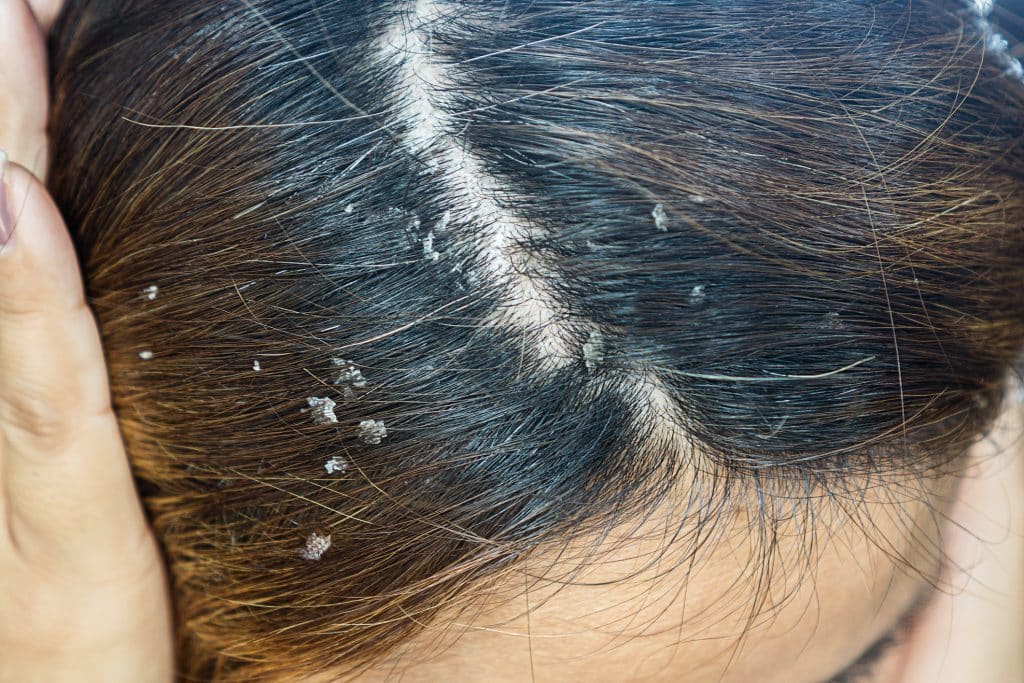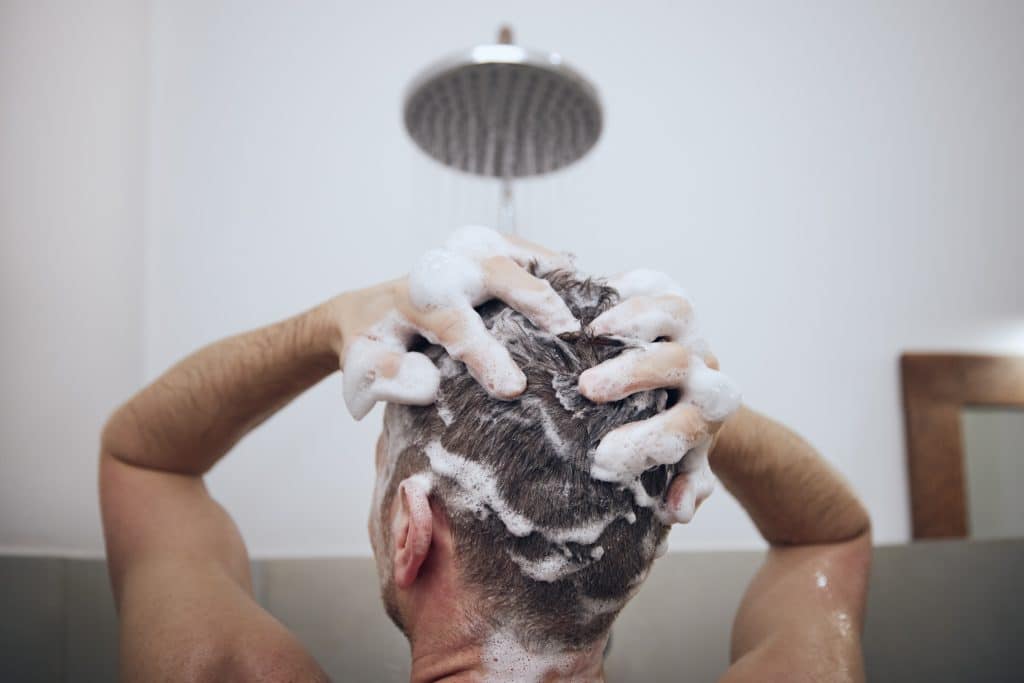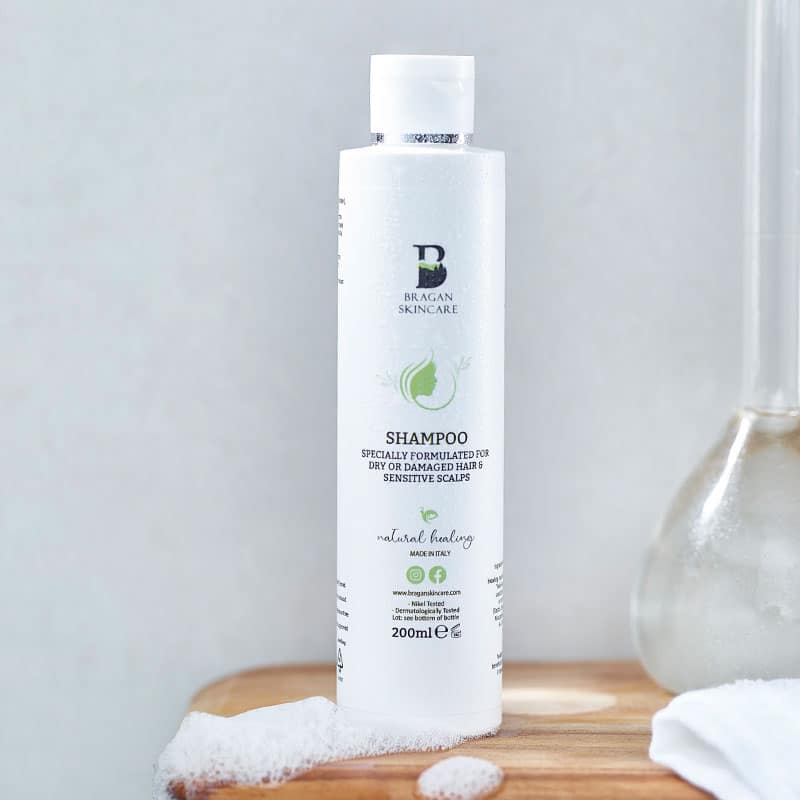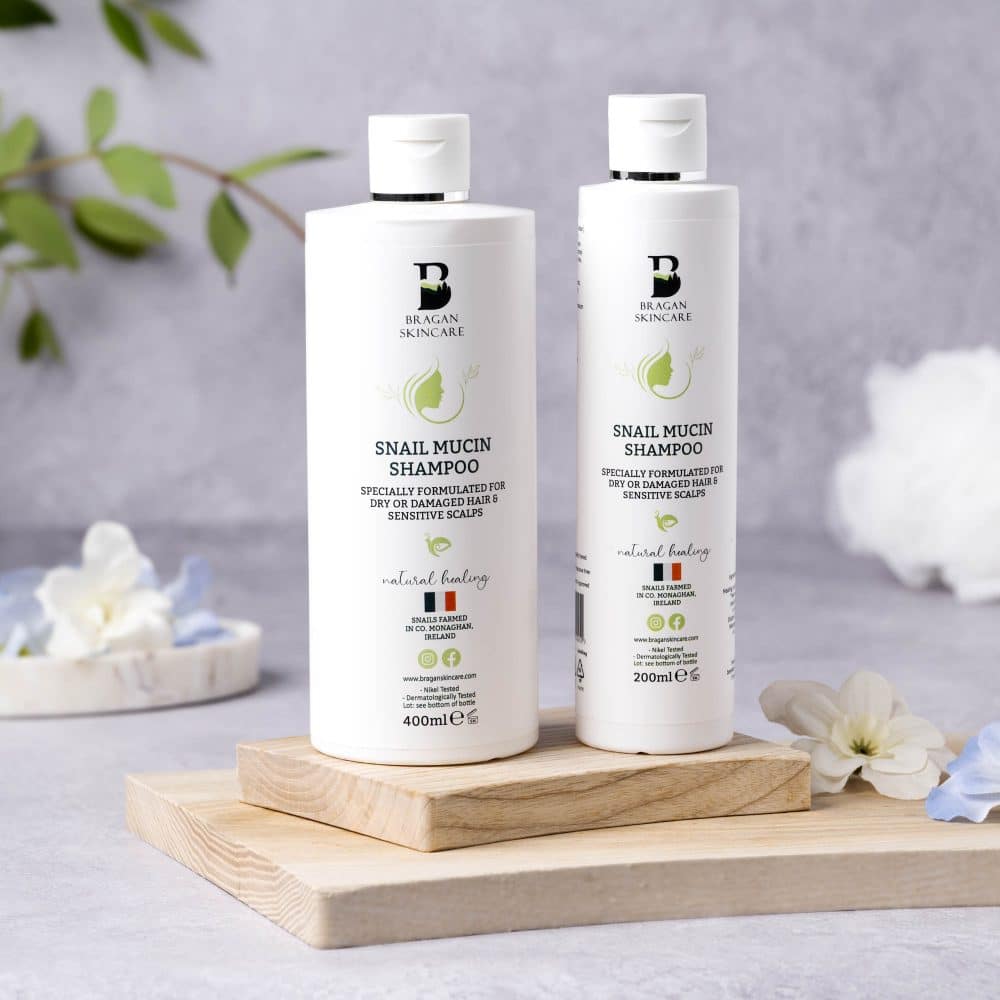Best Shampoo for Scalp Psoriasis: What Really Works for Sensitive Scalps
Scalp psoriasis can feel overwhelming—especially on a sensitive scalp. The constant itchiness, flaking, and redness can make everyday life uncomfortable. Choosing the right shampoo isn’t just important—it’s essential. The right formula can soothe irritation, reduce flare-ups, and improve scalp health. In this guide, we’ll highlight what actually works for sensitive scalps (including gentler actives and care tips).
- What actually works for sensitive scalps
- Wash 3–4×/week; keep lather on for the label’s dwell time, then rinse.
- Rotate salicylic acid (lift scale) and coal tar (calm redness/turnover).
- Between washes, moisturise scalp skin (fragrance-free) to reduce tightness/itch.
- Avoid sulphates, parabens, added fragrance; use lukewarm water.
- If plaques are widespread or unresponsive after a few weeks, see your clinician for a short-course prescription shampoo.

Table of Contents
Key Shampoo Ingredients (and Who They Suit)

Understanding Scalp Psoriasis
Living with scalp psoriasis can be more than just a skin condition—it can affect your confidence, comfort, and daily life. If you’re familiar with symptoms such as flaking, redness, and discomfort, it’s crucial to comprehend the underlying causes. This section will explain what scalp psoriasis is and explore the factors that make caring for sensitive scalps challenging.
What is Scalp Psoriasis?
Scalp psoriasis is a common autoimmune condition that causes skin cells to multiply faster than usual, leading to thick, scaly patches. When it affects the scalp, these patches often appear on the hairline, behind the ears, or even across the entire scalp. One of the most visible signs is flaky, silver-white scales that are often mistaken for dandruff, but scalp psoriasis brings far more to deal with than a few flakes.
Key symptoms include:
- Flaking: Large, noticeable scales that shed from the scalp.
- Redness: Inflamed areas of skin that appear irritated.
- Itching: Persistent itchiness that can be mild or intense.
- Dryness: The skin may feel tight and dehydrated.
Unlike dandruff, the scales from scalp psoriasis can stick to the skin, causing discomfort. In severe cases, people might even experience painful cracks or temporary hair loss due to the inflammation.
Top Options for Sensitive Scalps
Managing scalp psoriasis becomes even trickier if you have a sensitive scalp. Everyday factors that don’t bother others can spark flare-ups, making it challenging to find products that help rather than harm.
Common Triggers for Scalp Psoriasis
Certain triggers can make symptoms worse, whether it’s a sudden change in temperature or a stressful week. Knowing these triggers can help you stay ahead of flare-ups:
- Stress: Emotional or physical stress often acts as a key trigger. Your scalp reacts to stress hormones, worsening inflammation.
- Weather Changes: Cold air and hot showers can strip away moisture, leaving the skin on your scalp more irritated.
- Harsh Chemicals: Many shampoos on the market contain sulphates, parabens, or synthetic fragrances. These can irritate sensitive scalps and make psoriasis worse.
Why Many Shampoos Fail Sensitive, Psoriasis-Prone Scalps
If you’ve ever wandered the haircare aisle, you know the frustration. Many shampoos promise relief but fail to deliver, especially for those with psoriasis. The wrong formula can sting, over-dry, or strip your hair and scalp of its natural balance.
Sensitive scalps don’t respond well to strong ingredients designed to tackle flakes or oil build-up. Instead, they require soothing, hydrating formulations that can calm inflammation without adding irritation. Balancing effectiveness with gentleness is where the real challenge lies, and it’s no wonder so many people feel they’re endlessly searching for a solution.
Understanding your condition and its triggers can be the first step towards relief. In the next sections, we’ll explore what to look for in a scalp psoriasis shampoo and highlight products that truly work for sensitive scalps.
Key Shampoo Ingredients (and Who They Suit)
When choosing a shampoo for scalp psoriasis, it’s essential to know what to look for. Not all shampoos are the same, and the ingredients they contain can significantly impact their effectiveness. Here are some of the key components to consider when shopping for one that works effectively for sensitive scalps.
Salicylic Acid for Flake Removal
One of the standout ingredients in psoriasis shampoos is salicylic acid. Renowned for its exfoliating properties, this ingredient helps break down the thick, scaly patches that form due to psoriasis. Ever wondered why these scales seem so stubborn? It’s because the condition accelerates skin cell production, leading to layers of dead skin that don’t shed naturally.
Salicylic acid works by softening and loosening these scales, making them easier to remove. Think of it as gently dissolving the “glue” that binds dead skin cells together. The result? A cleaner scalp with less visible flaking. Apart from helping with scales, this ingredient can also improve the effectiveness of other treatments by allowing them to penetrate deeper into the skin.
Keep in mind that while salicylic acid can help lift scale, very sensitive scalps may find it drying. Patch-test and start slowly.
Coal Tar for Reducing Inflammation
Coal tar has been used for decades to help psoriasis. It slows excess skin-cell turnover and can reduce the look of redness. Some people dislike the scent—try lower-strength formulas or rotate with other actives. Tar products can increase sun sensitivity, so take care with outdoor exposure.
Gentle Ingredients for Sensitivity
When dealing with both psoriasis and a sensitive scalp, it’s vital to choose products with gentle, soothing ingredients. This is where nature’s remedies come into play. Ingredients like aloe vera, oatmeal, and chamomile are excellent for reducing irritation and providing relief.
- Aloe Vera: A natural moisturiser that can cool the scalp while reducing redness and itchiness. It’s like a calming balm in a bottle.
- Oatmeal: Colloidal oatmeal in particular forms a protective barrier on the skin, locking in moisture to combat dryness. It’s perfect for people whose scalps feel tight or flaky.
- Chamomile: Known for its calming properties, chamomile can soothe irritated skin and reduce sensitivity.
These ingredients nurture your scalp without stripping it of its natural oils, which is essential when dealing with psoriasis. Harsh chemicals can make symptoms worse, so it’s worth prioritising shampoos that skip unnecessary additives like sulphates, parabens, and synthetic fragrance.
Prioritise formulas without sulphates, parabens, or added fragrance, and keep routines short and lukewarm to avoid extra irritation.
Spotlight on Snail Mucin (for Sensitive Scalps)
Snail mucin might sound unusual, but it’s gained a loyal following for its ability to soothe and heal skin. Surprisingly, its roots aren’t modern. This natural ingredient has been treasured for centuries as a remedy for various skin conditions. Now, it’s being recognised as a gentle yet powerful option to help sensitive scalps affected by conditions like psoriasis. Let’s take a closer look at its history, components, and why it works so well.
The History of Snail Mucin in Skincare
Using snail mucin for skincare isn’t a new trend. Evidence suggests it dates back to ancient Greek medicine, where Hippocrates recommended crushed snails mixed with sour milk for skin injuries. Farmers in Chile later noticed the skin-healing effects while handling snails for cosmetic use. They found small cuts on their hands healed faster, leaving their skin smoother and softer.
Today, products enriched with snail secretion filtrate (that’s the technical name) are everywhere in beauty and dermatology. Its ability to repair damaged skin has made it a popular choice in anti-ageing creams, acne treatments, and now even scalp care.
For those with sensitive scalps, especially those dealing with psoriasis, its history of soothing properties makes it a valuable ingredient. With its rich mix of beneficial compounds, snail mucin bridges tradition with science.
Snail secretion filtrate is widely used for hydration and barrier support. Historical references (e.g., Hippocratic era) are anecdotal; modern care still relies on gentle routines and clinician-guided treatments when needed.
Key Components of Snail Mucin
Snail mucin isn’t just a single wonder ingredient—it’s packed with components that benefit the skin and scalp. Here’s what makes it so effective:
- Glycolic Acid:
Snail mucin contains a natural dose of glycolic acid, a type of alpha-hydroxy acid (AHA). It works to gently exfoliate dead skin cells, making way for new growth. For those suffering from scalp psoriasis, where scaly patches form, glycolic acid helps break them down without causing irritation. - Hyaluronic Acid:
Known as a hydration powerhouse, hyaluronic acid holds up to 1,000 times its weight in water. In snail mucin, it delivers deep moisture, helping to soothe dry, itchy, and irritated scalps. Think of it as giving your skin a long drink of water. - Proteins:
Proteins in snail mucin help repair damaged skin barriers. For psoriasis-prone scalps, this means strengthening the skin, reducing redness, and improving its ability to retain moisture. - Antioxidants:
Snail mucin is rich in antioxidants such as zinc, which helps calm inflammation and protects skin from external irritants. It functions as a protective barrier against the external environment. - Allantoin:
This lesser-known ingredient found in snail mucin is a miracle for sensitive skin. It promotes healing, reduces irritation, and softens the skin, making it an excellent choice for calming psoriasis flare-ups.
The balance of these components distinguishes snail mucin. Together, they form a versatile ingredient that simultaneously hydrates, repairs, and protects the skin.
Why Snail Mucin Works for Sensitive Scalps
Dealing with a sensitive scalp can be challenging. Many treatments for conditions like psoriasis often contain harsh chemicals that irritate already inflamed skin. This is where snail mucin shines.
- Gentle Hydration: Unlike many scalp treatments that leave dryness behind, snail mucin works to lock in moisture. For people with psoriasis, this helps alleviate the tight, flaky feeling that often comes with the condition.
- Calming Properties: Many people find it soothing; ingredients like allantoin are associated with skin comfort.
- Supports Skin Repair:
- Psoriasis damages the skin barrier, but the proteins and glycolic acid in snail mucin encourage faster healing. This can reduce the appearance of scaly patches over time.
- Non-Irritating Formula: Many shampoos don’t cater to the needs of sensitive scalps, but snail mucin is naturally mild. It provides care without stripping the skin of its natural oils or causing further harm.
Snail mucin could be the missing component for those managing the dual challenges of psoriasis and sensitivity. Its hydrating, calming, and repairing properties provide relief without compromising scalp health. Whether in shampoos or treatments, it’s an ingredient worth watching for anyone looking to care for both their scalp and skin.
Top Psoriasis Shampoos for Sensitive Scalps
Finding the right psoriasis shampoo can feel like a never-ending quest. For sensitive scalps, the balance between effective ingredients and gentle care is crucial. While there are many products on the market, not all are suited for those battling both psoriasis and sensitivity. Below, we’ll explore over-the-counter options for milder cases and prescription-strength shampoos for more severe scalp psoriasis.
Over-the-Counter Options
Over-the-counter (OTC) psoriasis shampoos are often the first choice for anyone looking to manage symptoms like flaking, redness, and itching. These shampoos combine active ingredients with soothing components to minimise irritation and provide much-needed relief. Here are some popular OTC options that strike the right balance:
- Neutrogena T/Gel Therapeutic Shampoo
- Active Ingredient: Coal tar
- This shampoo is highly recommended for reducing inflammation and slowing down excessive skin cell turnover, which helps clear stubborn plaques. Its gentle formula is suitable for sensitive scalps, though some may find the tar scent off-putting.
- MG217 Psoriasis Medicated Conditioning Shampoo
- Active Ingredient: 3% coal tar
- With conditioning properties, this shampoo aims to treat scaling and prevent drying out the scalp. The added moisture makes it a good pick for those dealing with tight, itchy skin.
- Head & Shoulders Clinical Strength Shampoo with Selenium Sulfide
- Active Ingredient: Selenium sulfide
- Designed to fight both flaking and dryness, its medicated strength combined with a gentle cleansing formula offers effective treatment for mild psoriasis.
- E45 Dry Scalp Shampoo
- Key Ingredients: Urea and polidocanol
- A perfect choice for sensitive scalps, E45 combines urea for hydration with an ingredient that soothes itching. It’s free from harsh chemicals like sulphates and parabens.
These shampoos deliver relief for mild to moderate symptoms and are usually easy to incorporate into a routine. However, they won’t always be enough for severe flare-ups or long-term control. This guide is general information and not a substitute for personalised medical advice. Always follow your clinician’s instructions and seek help if symptoms persist or worsen.
Prescription-Strength Shampoos
Sometimes, scalp psoriasis requires a stronger approach. Prescription shampoos are designed for moderate to severe psoriasis and often include active ingredients that work more aggressively to calm inflammation, remove scaling, and restore healthy skin.
Prescription treatments should be clinician-directed and used for short courses unless advised otherwise:
- OTC products aren’t providing enough relief.
- Symptoms such as redness, scaling, or itching are worsening.
- Patches cover larger areas of the scalp.
Key ingredients commonly found in prescription shampoos include:
- Corticosteroids:
Corticosteroid-based shampoos (such as betamethasone or clobetasol) are used to reduce inflammation and relieve itching quickly. Think of these as short-term fixes to break the cycle of flare-ups. - Vitamin D Analogues:
These shampoos contain synthetic forms of vitamin D, like calcipotriol, to regulate skin cell production. They can reduce both scaling and the redness associated with psoriasis. - Salicylic Acid (High Concentration):
While salicylic acid is also found in OTC shampoos, prescription strength options deliver higher doses for more stubborn plaques. It exfoliates the scalp, allowing other treatments to penetrate better. - Coal Tar (Enhanced Formulas):
Prescription coal tar shampoos are stronger than OTC versions, making them effective at managing severe psoriasis symptoms.
When using prescription shampoos, always follow your healthcare provider’s instructions. These products are often part of a treatment plan that includes topical creams, oral medications, or light therapy. While they can provide relief, they aren’t designed for long-term, everyday use due to the risk of side effects like thinning skin or irritation when overused.
Prescription and OTC options both have their place in treating scalp psoriasis. For milder cases, OTC shampoos may work well enough to soothe and manage daily symptoms. However, for those tough flare-ups or persistent patches, prescription shampoos offer the strength needed to regain control.
Bragan Skincare’s Solution for Psoriasis Relief

Living with scalp psoriasis can be a daily challenge, but relief is within reach. While shampoos are often the front line of treatment, combining them with targeted skincare products can enhance results and provide lasting comfort. Bragan Skincare’s Atopic Cream is a powerful addition to your routine, designed to work hand-in-hand with shampoos to address psoriasis symptoms effectively.
How to Build a Calming Wash Routine
Shampoos are excellent at cleansing the scalp, removing flakes, and delivering active ingredients to reduce scaling and irritation. However, a shampoo alone often cannot offer sustained hydration or deeper skin repair. This is where Atopic Cream becomes the perfect partner.
After using an appropriate psoriasis shampoo, such as one with coal tar or salicylic acid, the scalp may feel stripped or vulnerable. Applying a cream like Bragan’s Atopic Cream restores balance by moisturising and protecting the skin barrier. Think of it as the protective coating your scalp needs after being thoroughly cleansed.
Here’s how the Atopic Cream complements shampoo use:
- Soothes Inflammation: Shampoos tackle surface symptoms, but the cream works deeply to calm redness and irritation that shampoo can’t fully address.
- Locks in Moisture: Hydration is critical for anyone with psoriasis, as dry skin exacerbates flare-ups. The cream ensures the scalp stays hydrated long after your shampoo has been rinsed away.
- Supports Skin Barrier Repair: Psoriasis harms the skin’s protective barrier. While shampoos can help peel away scales, Atopic Cream aids in restoring the skin’s natural defence.
- Addresses Ongoing Symptoms: While shampooing isn’t an everyday activity for many, applying a soothing cream daily ensures consistent care between washes.
By integrating Atopic Cream into your routine, you’re bridging the gap between short-term relief (shampoo) and long-term care (hydration and repair). It’s a simple yet effective combination to help alleviate the discomfort of scalp psoriasis.
What Makes Atopic Cream Unique?
Bragan Skincare’s Atopic Cream isn’t just another moisturiser; it’s been specially formulated with sensitivity and effectiveness in mind. If you’ve struggled to find a product that doesn’t aggravate your scalp, the Atopic Cream has been designed to offer gentle but powerful care.
What sets this cream apart? Let’s examine its standout features:
- Natural Ingredients: The cream is enriched with plant-based extracts and soothing compounds. Free from harsh additives like parabens and sulphates, it’s safe for those with sensitive skin. Ingredients such as aloe vera and chamomile work together to calm inflamed areas naturally.
- Hypoallergenic Formula: Understanding that psoriasis sufferers often battle sensitivities to skincare products, this formulation avoids known irritants. It’s been dermatologically tested to ensure maximum compatibility, even for the most delicate scalps.
- Fast Absorption: Unlike some creams that feel greasy or heavy, Bragan’s Atopic Cream absorbs quickly into the skin. This lightweight texture ensures it doesn’t weigh hair down or leave residue. It’s effective and convenient for daily use.
- Multi-Purpose Benefits: Besides addressing psoriasis, this cream offers hydration and soothing properties that make it beneficial for anyone with an itchy, dry, or irritated scalp.
By choosing a product like Atopic Cream, you’re investing in a solution that considers every aspect of scalp care. It acknowledges the dual challenges of psoriasis—irritation and sensitivity—and addresses both with a thoughtful formula.
For those seeking true relief, combining a high-quality shampoo with Bragan Skincare’s Atopic Cream could be the key to transforming your care routine. The cream brings the hydration, protection, and healing boost that shampoos alone can’t fully deliver. Psoriasis care requires consistent, tailored efforts—and with this combination, you’re equipped for effective results.
Conclusion
Caring for scalp psoriasis, especially for sensitive scalps, requires thoughtful product selection and a gentle approach. Shampoos with active ingredients like salicylic acid or coal tar can help manage symptoms such as flaking, redness, and inflammation, while natural options like aloe vera or chamomile offer soothing relief.
Snail mucin stands out as a unique addition to the conversation, thanks to its centuries-old history and well-known for hydration and barrier support. Its mix of glycolic acid, hyaluronic acid, proteins, and antioxidants provides hydration, promotes healing, and calms irritation, making it a versatile solution for sensitive scalps.
For a complete care routine, combining a targeted shampoo with a product like Bragan Skincare’s Atopic Cream can deliver both immediate and long-term benefits. By addressing hydration and skin repair, this duo offers a holistic approach to managing scalp psoriasis effectively.
If you’re ready to find relief, start by experimenting with the right products for your scalp. Have you found a go-to shampoo or treatment that works? Share your journey below and help others discover solutions.
If you have known mollusc allergies, consult your clinician before use.
Shampoo for Sensitive Scalp
Plus free Skin Soothe tool with every purchase from our hair care range while stocks last! Bragan Skincare Sensitive Scalp Shampoo Our sensitive scalp shampoo harnesses the power of snail mucin to deliver gentle cleansing and deep nourishment to your hair, while soothing irritated, dry and itchy scalps. Great hair starts with a healthy scalp. Made from natural ingredients, fragrance free and with no parabens or harsh chemicals, it is ideal for those suffering with Eczema, Psoriasis, Dermatitis and various skin conditions. Snail mucin is rich in allantoin, glycolic acid, and peptides, which calm irritation, promote repair, and lock in…
Further reading
- NHS — Psoriasis overview:
https://www.nhs.uk/conditions/psoriasis/ - British Association of Dermatologists — Scalp psoriasis (Patient Information Leaflet):
https://www.skinhealthinfo.org.uk/condition/scalp-psoriasis/ - Irish Skin Foundation — Psoriasis:
https://irishskin.ie/psoriasis/
Updated: 1 September 2025
Often 3–4 times a week. Leave the lather on for the label’s dwell time, then rinse. On other days, use a gentle, fragrance-free shampoo.
Salicylic acid softens and lifts thick scale; coal tar helps calm redness and rapid skin turnover. Many people alternate them based on symptoms.
They can if overused. Follow label guidance and moisturise the scalp skin between washes to reduce tightness and itch.
If OTC options aren’t helping after a few weeks, or if plaques are widespread/painful. Prescription treatments should be clinician-directed and used for short courses unless advised otherwise.
Yes—apply a fragrance-free conditioner to the lengths/ends after rinsing the medicated shampoo.
About the author:
Kieran Corley creates evidence-informed skincare content for Bragan Skincare, specialising in sensitive skin and barrier-support routines. Their guides translate ingredient science—like salicylic acid, coal tar, colloidal oatmeal, and snail mucin—into clear steps you can actually follow. They work closely with formulators and customers to keep recommendations gentle, fragrance-free, and practical for everyday life. Outside of writing, they’re testing textures, reviewing patch-test notes, and refining routines for eczema- and psoriasis-prone skin. This article is general information only and not medical advice—please consult your clinician for diagnosis and treatment.
Featured Bragan Skincare Products
-
€39.99 – €100.00Price range: €39.99 through €100.00Select options This product has multiple variants. The options may be chosen on the product page
-
€100.00Select options This product has multiple variants. The options may be chosen on the product page

